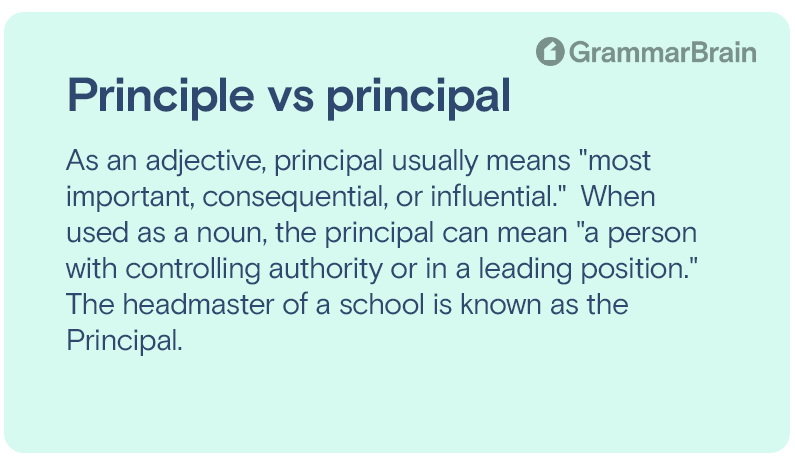What’s the difference between principle and principal? The words principle and principal are so similar that most people have difficulty determining which word means which. In this article, we’ll go over the differences between these two easily confused words to help you distinguish between your principles and principal.
When the term principal is used as an adjective, it means “the most valuable.” and principal, as a noun, refers to someone in a position of authority or the headmaster of the school. In contrast, the principle can only be used as a noun to refer to “a fundamental truth.” Or “a fundamental performance that motivates one’s behavior,” as in “following one’s principles.”

Principle vs. Principal meaning and definition
Both words principle and principal are derived from Latin and have similar origins. Each of these words is a noun, but only the principal can be used as an adjective.
The Latin root of principle is principium, which means “source,” and the root of principal is principalis, which means “first.”
As an adjective, principal usually means “most important, consequential, or influential.” When used as a noun, the principal can mean “a person with controlling authority or in a leading position.” The headmaster of a school is known as the Principal.
As a noun, the principle can refer to a general or fundamental truth, as well as a governing law of conduct. In its most basic sense, principle refers to fundamental law, truth, rule, or assumption.
Difference between principle and principal
Not only does principle differ from the principle in meaning, in addition, but it also does not feature as an adjective; principled is the adjectival form of principle.
Even though both words are homophones as they sound similar and have the same distanced roots in Latin. Still, principle and principle emerge from different French origins and have always been different words in English.
The word “principle” is a noun with two meanings—an essential truth upon which belief and moral systems are built. A principal is used as an adjective as well as a noun. When employed as an adjective, the principal can mean either the top position in importance order. Or the initial amount of money invested, which is known as the principal amount. When employed as a noun, a principal can also refer to the head of an educational facility.
Proper uses of principle (with examples)
The term “principle” is a noun that is used to refer to a moral law or belief. Here are a couple of common sentences that use the word “principle,” so you can learn more about how to use it correctly:-
- Americans take the principle of free speech for given.
- As an issue of principle, I should speak out.
- The country is governed as per socialist principles.
- The organization operates on the principle that all members have equal rights.
- He is a man of principles.
Proper use of principal (with examples)
The word “principal” as a noun means an individual of great authority. Such as:
- Our school’s principal will be replaced soon.
In finance, “principal” is used as a loan amount that must be repaid. In law, a “principal” is a person who bears primary responsibility for a moral duty such as:
- How much of your loan’s principal have you repaid?
- This is her principal motivation for relocating.
- This is her principal motivation for relocating.
Conclusion of Principle vs. Principal
These two words have different meanings, so make sure you use the correct one when deciding whether to use principal or principle in your sentence.
Inside this article
Fact checked:
Content is rigorously reviewed by a team of qualified and experienced fact checkers. Fact checkers review articles for factual accuracy, relevance, and timeliness. Learn more.
Core lessons
Glossary
- Abstract Noun
- Accusative Case
- Anecdote
- Antonym
- Active Sentence
- Adverb
- Adjective
- Allegory
- Alliteration
- Adjective Clause
- Adjective Phrase
- Ampersand
- Anastrophe
- Adverbial Clause
- Appositive Phrase
- Clause
- Compound Adjective
- Complex Sentence
- Compound Words
- Compound Predicate
- Common Noun
- Comparative Adjective
- Comparative and Superlative
- Compound Noun
- Compound Subject
- Compound Sentence
- Copular Verb
- Collective Noun
- Colloquialism
- Conciseness
- Consonance
- Conditional
- Concrete Noun
- Conjunction
- Conjugation
- Conditional Sentence
- Comma Splice
- Correlative Conjunction
- Coordinating Conjunction
- Coordinate Adjective
- Cumulative Adjective
- Dative Case
- Determiner
- Declarative Sentence
- Declarative Statement
- Direct Object Pronoun
- Direct Object
- Diction
- Diphthong
- Dangling Modifier
- Demonstrative Pronoun
- Demonstrative Adjective
- Direct Characterization
- Definite Article
- Doublespeak
- False Dilemma Fallacy
- Future Perfect Progressive
- Future Simple
- Future Perfect Continuous
- Future Perfect
- First Conditional
- Irregular Adjective
- Irregular Verb
- Imperative Sentence
- Indefinite Article
- Intransitive Verb
- Introductory Phrase
- Indefinite Pronoun
- Indirect Characterization
- Interrogative Sentence
- Intensive Pronoun
- Inanimate Object
- Indefinite Tense
- Infinitive Phrase
- Interjection
- Intensifier
- Infinitive
- Indicative Mood
- Participle
- Parallelism
- Prepositional Phrase
- Past Simple Tense
- Past Continuous Tense
- Past Perfect Tense
- Past Progressive Tense
- Present Simple Tense
- Present Perfect Tense
- Personal Pronoun
- Personification
- Persuasive Writing
- Parallel Structure
- Phrasal Verb
- Predicate Adjective
- Predicate Nominative
- Phonetic Language
- Plural Noun
- Punctuation
- Punctuation Marks
- Preposition
- Preposition of Place
- Parts of Speech
- Possessive Adjective
- Possessive Determiner
- Possessive Case
- Possessive Noun
- Proper Adjective
- Proper Noun
- Present Participle
- Prefix
- Predicate



